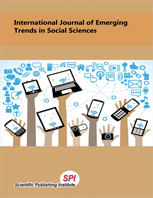Effect of Ethno-Religious Crises on the Infrastructure of Wukari Town, Taraba State, Nigeria
DOI:
https://doi.org/10.20448/2001.11.22.28Keywords:
Ethno-religious, Crises, Infrastructures, Nigeria, Destruction Peace.Abstract
The study is aimed at Effect of Ethno-Religious Crises on the Infrastructures of Wukari Town in Taraba State. Using Cochran (1977) method of sample size determination, a total of 196 questionnaire was distributed to respondents. A total of forty (40) copies of the questionnaire was distributed each to T-Junction, Wapan Nghaku, Old BB and Mission areas. And thirty (30) was distributed to GRA extension. Purposeful and stratified sampling technique was use and the head of household or next elderly literate person in a household was the respondent. Descriptive statistics were used to analyse the data and the research covers the period of crises that occurred around 2012-2015 in Wukari town. The study indicates that housing is the most affected infrastructures with (43.39%). And this is responsible for out-migration and reduction of economic activities in the area. Also, the study reveals that the effect of the crises on infrastructures include decay and destruction of infrastructures (29.63%), inadequate manpower(28.04%), increase in rents(22.22%), and difficult banking services(20.11%). The study therefore, suggests religious tolerance, public enlightenment, discouragement of formation of ethnic militia and avoidance of mutual suspicion as a way of mitigating crises. The study concludes that peace remains the only factor for development. As such, all stakeholders must put in their best to ensure continuous co-existence among the people.


